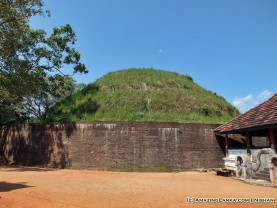Deliwala Kota Vehera Buddhist Temple, Sri Lanka

Address
Deliwala Kota Vehera Buddhist Temple, Deliwala, Rambukkana Kegalle District, Sri Lanka
Diety
Buddha
Introduction
Deliwala Kota Vehera is an ancient Stupa located in the village of Deliwala in Kegalle District, Sri Lanka. It is considered as one of the earliest Stupas in the country. The colossal Stupa can be identified as the most interesting monument of the temple. It is a Kota Vehera styled Stupa (a squat Stupa) constructed of solid earth (natural mound of bedrock) thinly faced with brick. As recorded by Bell, the circumference of the Stupa at its base is 213 yards. Between 1972-1978, the Stupa was excavated and conserved by the Archaeological Department (Abeyawardana, 2002). However, some parts of it were collapsed in 1998 compelling the Department to carry out further excavations during the latter part of 2000 (Abeyawardana, 2002)
Puranic Significance
This temple is believed to have been constructed during the reign of King Devanampiyatissa [(250- 210 A.D.). Bricks with masonry marks in Brahmi letters and some sealimpressed coins discovered from the site have confirmed that the Deliwala temple has a long history extending to the pre-Christian era (Abeyawardana, 2002). The temple was destroyed during the period of invasions carried out by Magha (1215–1236 A.D.) of Kalinga (Abeyawardana, 2002). It was restored again during the Buddhist renaissance in the Kandyan Period (Abeyawardana, 2002). There is another belief that this was built by King Parakramabahu ( 1153-1186) while he was staying there but left to Pollonnaruwa leaving the stupa in a incomplete state. In 1892, A.C. Bell has reported that the stupa’s circumference being 640 feet, and the height as 112 feet. Although treasure hunters have missed this stupa, it has been in a very dilapidated state when it was found. It was also reported that this was built using thin layer of bricks as the shell and filled with earth inside. According to Prof. Paranavithana this stupa has been built by shaping a small natural hill and building a brick shell over the hill. During excavations in 1957, a golden casket of about 3 inches height was discovered near the Pesa Walalu. This was perfect replica of the Sanchi Stupa in India. A relic chamber was not present in this stupa but in addition to the golden casket, 173 smaller caskets and 2 gemstone caskets have been discovered in the stupa. Today the stupa is 160 m in circumference.
Century/Period/Age
250- 210 A.D
Managed By
Department of Archaeology
Nearest Bus Station
Rambukkana
Nearest Railway Station
Rambukkana Station
Nearest Airport
Colombo





